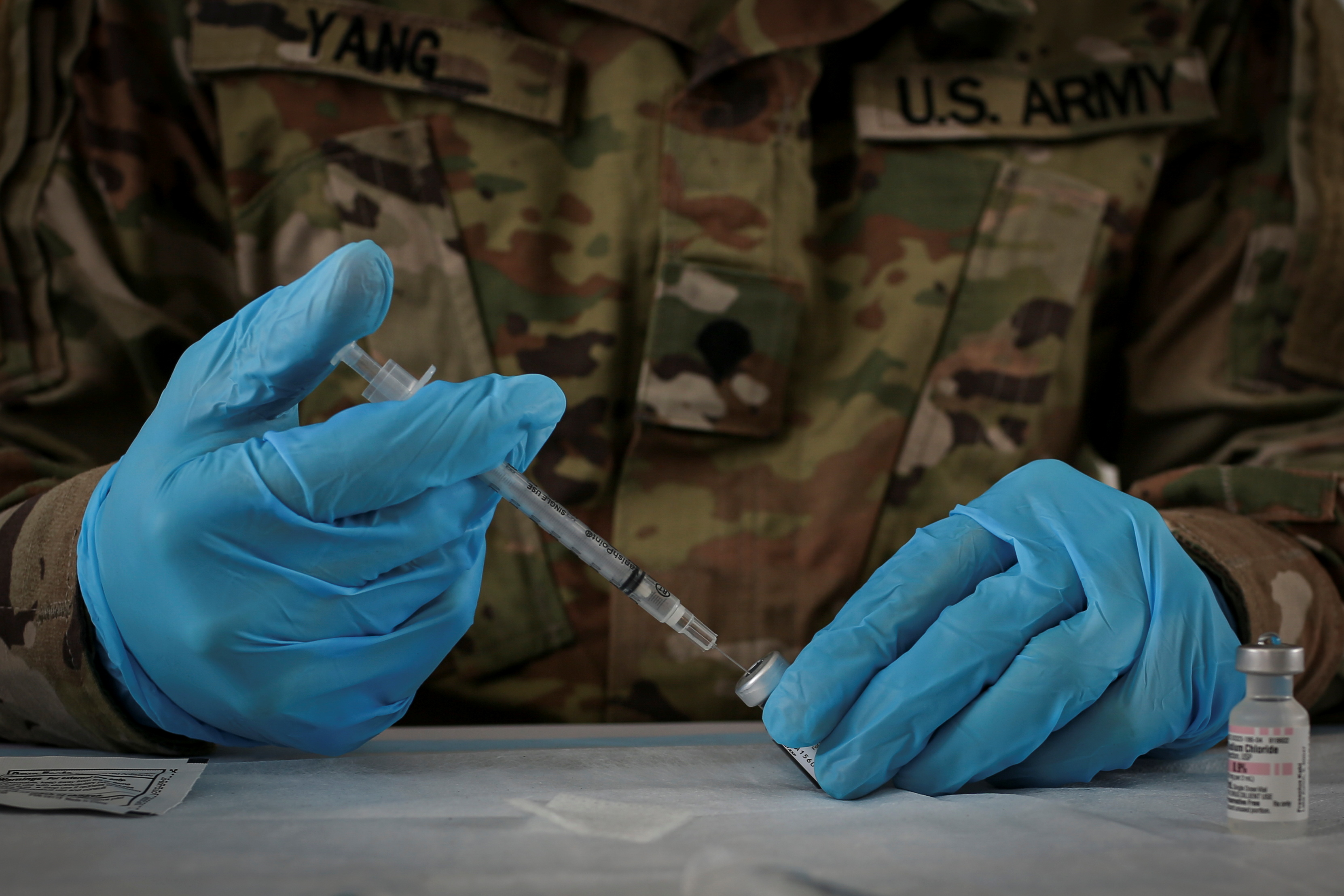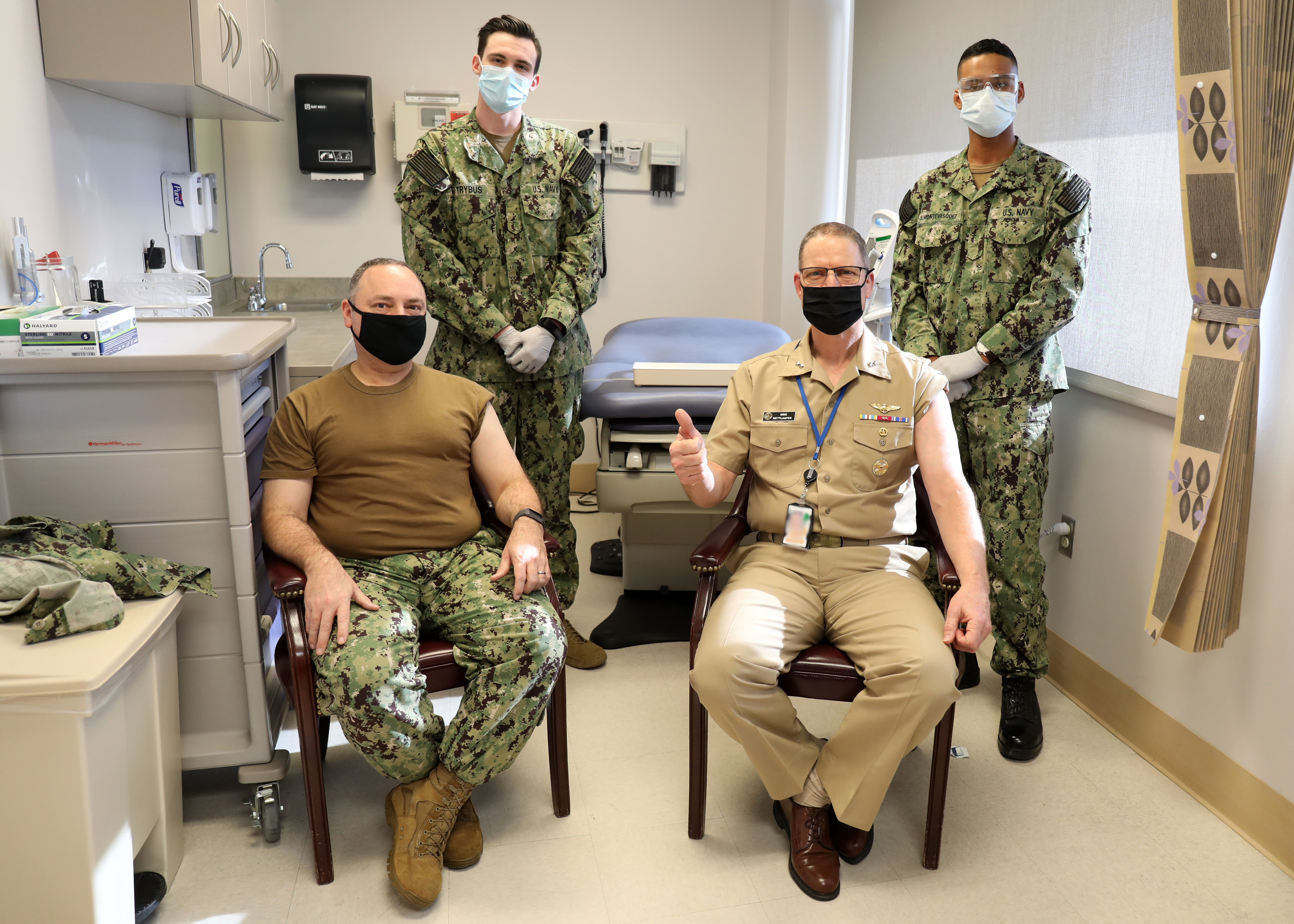Vacine Military - WASHINGTON - The Pentagon will order the Covid-19 vaccine for members of the military no later than mid-September, according to a new memo from Defense Secretary Lloyd Austin.
The deadline could be pushed forward if the Food and Drug Administration gives final approval to Pfizer's vaccine, which is expected early next month. The military will have the next few weeks "preparing this transition," Austin said.
Vacine Military
Last month, as a result of the increase in Covid cases, President Joe Biden said that federal employees will be required to certify that they are fully vaccinated and that those who are not will be required to wear masks and social distance from other employees and visitors.
Covid19 Vaccine Mandate To End For Military
"I am proud that our military men and women will continue to help lead the charge in the fight against this pandemic, as they do so often, leading by example to keep their fellow Americans safe," the president said.
USA Army Soldiers from the 2nd Armored Brigade Combat Team, 1st Infantry Division prepare Pfizer Covid-19 vaccines to inoculate people on the North Campus of Miami Dade College on March 9, 2021 in North Miami. File Joe Raedle/Getty Images
More than 1 million service members are fully vaccinated and another 237,000 are partially vaccinated, according to the Department of Defense. The military has the most fully vaccinated officers, with the navy and air force not far behind.
The vaccine mandate in the military is "not new" and troops have received multiple vaccines since the first days of basic training, Chairman of the Joint Chiefs of Staff Mark Milley said in a memo to the Force.
Navy Sets Timeline And Discharge Details For Those Refusing The Covid 19 Vaccine > United States Navy > Display Pressreleases
Milley encourages service members to contact force medical leaders and providers with questions about side effects or implications.
"If you have the vaccine, thank you. If you don't have the vaccine yet, do it to protect yourself and those around you," Milley said.
Austin said he will monitor infection rates closely and won't hesitate to act sooner or recommend a different course to the president if he feels the need. The U.S. Department of Defense (DOD) is in the final stages of a largely effective COVID-19 vaccination campaign, but a small percentage of service members are hesitant about the vaccine. As the effort enters its second year, military planners and policymakers should reflect on the nature of this uncertainty to improve U.S. military preparedness for future global health crises and similar contingencies.

In December 2020, when the first vaccine against COVID-19 reached the US, According to Food and Drug Administration (FDA) criteria for emergency use approval, the DOD has implemented a staggered vaccination schedule. Military health personnel, service members responsible for critical national capabilities or readiness for overseas deployments, and high medical risk individuals were given first priority. Although the department encouraged all members to get vaccinated, it was voluntary until the FDA gave full approval.
Fauci Says A Vaccine Is Possible By The End Of The Year
For more than eight months of campaigning, even during the transition between presidential administrations, the DOD's policy on vaccination against COVID-19 has remained the same. However, in August 2021, when the FDA fully approved the first vaccine against covid-19, the Department of Defense exposed the vaccination of all active duty and Ready Reserve members of the armed forces.
A weekly roundup of the latest of the week's big foreign policy stories, with maps, opinions and explanations. Every Friday
A collection of original analyses, data visualizations and commentary, examining debates and efforts to improve health around the world.
By entering your email and clicking Subscribe, you agree to receive advertisements from us about our products and services, as well as invitations to events. You also agree to our privacy policy and terms of use.
Catholic Troops Can Reject Covid Vaccine If It Violates Conscience, Archbishop Timothy Broglio Says
The DOD authorized all military services, the US Air Force, Army, Navy, Marine Corps, and US Space Force, to carry out this order as each deemed appropriate, but instructed "ambitious timelines for their implementation". The services then established unique vaccination timelines for their components, from early November 2021 for active-duty airmen to mid-December for sailors and reservists. The only extension is June 30, 2022 for members of the Army Ready Reserve, due to force structure and logistical challenges.
As of December 2021, more than 97 percent of the nearly 1.4 million active-duty service members were vaccinated. Nearly half of unvaccinated active duty members have submitted requests for exemptions or accommodations, which are being processed. Members can apply for medical and administrative exemptions or religious accommodations, but so far only medical and administrative exemptions have been approved by any service.
Recently, the US The Air Force is the first service to discharge members who refuse the vaccine. USA The Marine Corps discharged 103 members soon after. The US Army and Navy also intend to discharge members who refuse the vaccine. However, the total number of service members who refuse vaccination will not increase, as recruits are now required to acknowledge and comply with the vaccination mandate as a prerequisite to joining the military.

Younger service members are more likely to refuse the vaccine. For example, the twenty-seven newly discharged airmen from the Air Force had less than six years of military experience. This trend is consistent with an April 2021 analysis of vaccination among military members by the DOD Defense Health Agency. The study also found that among all active-duty forces, "non-Hispanic black service members were 28 percent less likely to initiate vaccination." Additionally, in the first three months of the DOD vaccination campaign, female service members were 10 percent less likely than their male counterparts to initiate vaccination. Factors associated with higher vaccination rates include older age, education level, and rank.
U.s. Army Awards $599m In Contracts For Astrazeneca Vaccine, Lilly Antibody Vs. Covid 19
The limited availability of vaccines in the military is driven by many of the same factors that affect the civilian population. The first and arguably the most critical factor leading to vaccination in the military is misinformation, as some DOD leaders have acknowledged. This is consistent with ratings of hesitation among the broader population, but does not fully account for demographic differences, which, as the DOD has found in studies, are influenced by other "interpersonal and social factors."
Second, vaccine-hesitant service members express a general distrust of public institutions, both military and non-military, although at a significantly lower rate than the general public. This mistrust is often deep-rooted, shaped by various historical factors, and therefore more difficult to overcome than misinformation. While institutions can directly combat misinformation through outreach and education, restoring trust requires a longer, holistic approach. Sustained efforts to build trust over time are likely to reduce vaccination disparities between non-Hispanic black service members and young service members.
Risk personalization is a third important factor among vaccine-hesitant military personnel, especially young men. Ultimately, an individual's decision to accept a vaccine depends on how they perceive the risks of getting vaccinated compared to the risks of inaction. For example, in the late 1990s and early 2000s, the military required service members to receive the anthrax vaccine. Unlike the COVID-19 vaccine, the anthrax vaccine has not been widely distributed outside the military. Service members who refused, many of whom had accepted several other mandatory vaccinations throughout their careers, said the reported side effects weighed heavily on them.
In the case of COVID-19, the perception of lower risk for the young and healthy appears to be equally influential. However, these risk assessments can change quickly. For example, consider an Air Force unit anecdote: One of the largest increases in vaccinations in this wing occurred as deployed members were preparing to close U.S. medical facilities at Bagram Air Base in Afghanistan. There is nothing like the closing of the only available hospital within thousands of miles to change the risk assessment.
Navy Pulls Way Ahead Of The Other Military Services In Race To 100% Vaccination
A correlate of vaccination outside the military is political affiliation, and some have hypothesized that partisanship influences the vaccination decisions of service members. However, there are no data to support this assumption. Throughout the early stages of the pandemic, heads of all services acknowledged a broad current of vaccination that suggests partisan politics has negligible influence. Most doubters seem to be making a personal, not a political, statement when they reject the vaccine, which is consistent with historical experience. From the smallpox vaccine in the 18th century to the anthrax vaccine in the late 20th century, American service members have demonstrated a history of skepticism that predates today's hyperpoliticized environment.
Most doubters seem to be making a personal statement, not a political one, when they reject the vaccine.
While DOD's COVID-19 vaccination campaign was generally effective, leaders should consider adjustments to increase preparedness for future public health crises. Traditional hierarchical communication can work, but it is unlikely to motivate 100 percent of the current force. Future vaccine communication efforts should take into account demographic differences as well as hesitations caused by misinformation and mistrust. These efforts should emphasize transparency, acknowledge occasional mistakes, and quickly correct course, when appropriate.

The continued push for the covid-19 vaccine in the military, especially among black and non-Hispanic female members, should encourage DOD to accelerate progress on diversity and inclusion. Command teams that represent and reflect the forces they are authorized to lead are an essential element
Kentucky Senator Leads Group To Block Military Funding Vote Over Vaccine Mandate
Nytimes vacine, ebola vacine, pcv vacine, modern vacine, mmr vacine, covi vacine, vacine, recombinant vacine, prevnar vacine, johnson vacine, sinovac vacine, shingles vacine

0 Comments